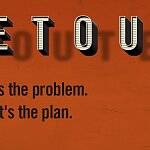Two Types of Forgiveness
By: Dr. Tony Evans
Forgiveness can operate on two levels. There is both unilateral forgiveness and transactional forgiveness. Unilateral forgiveness occurs when you forgive someone and yet the person has not asked for it, requested it, or even repented of what they did to you. Unilaterally means that on your own—without their involvement—you choose to grant them forgiveness.
Now, why would you grant someone forgiveness who doesn’t even want it and certainly doesn’t deserve it? The reason you grant unilateral forgiveness is so that you can keep going. Unilateral forgiveness keeps you from being held hostage to something the other person may never get right. It could be that the offense is so small that it is not a big deal to the other person, or it’s so small you don’t want to bring it up. Or maybe the person who hurt you has passed away and the opportunity for apologizing is no longer there.
This isn’t a deep, personal example of needing to forgive someone unilaterally but it is an example that I think can shed light on how and why we are to do this. Some years ago, a driver of another vehicle ran into my car and sped off. It was a classic hit-and-run. They left so quickly that I was unable to get their license plate, or even the make and model of their car. All I knew was that my car now had a huge dent in it and the person responsible was nowhere to be found. They didn’t tell me they were sorry. They didn’t offer me any insurance assistance. They just hurt my car and left.
Now it was up to me to get the dent fixed in my car, but I put it off a lot longer than I should have. I admit, I didn’t want to have to fix a dent that I did not create. My stubborn frustration kept me from getting my car fixed, but it was only me who was punished as a result. The person who caused the dent never knew. That person never had to see it. I was the one who had to climb into a dented car every day, being reminded of what had happened and getting re-frustrated all over again.
I was being held hostage to a person I didn’t even know. Many people are living with unforgiven dents on their souls.
Unilateral forgiveness means I forgive so that I can move on. I forgive so that I can let go. I forgive so that I can go get the dent fixed. When Stephen was being stoned to death as recorded in Acts 7, he asked God to forgive those who were killing him even in the midst of them killing him. They were still stoning him and he’s forgiving them. Guess what happened when he did that? He looked up and saw heaven open up and Jesus standing on the right hand beside the Father. Why is that important to know? Because it reveals to us that forgiveness gives you a new level of access to God. It gives you a more intimate relationship with the Savior. It gives you hope in the harm and peace in the problems.
Never let the fact that the person who has hurt you has neither asked for forgiveness, nor demonstrated that they deserve it. You are to forgive so that you are no longer held hostage to an offense, person, circumstance, or loss. By an act of your decision, you release them so that you can keep going to your destiny. Nothing will hold you hostage to your detours and thus keep you from your destiny like unforgiveness.
Forgiveness is a beautiful word when you need it. It is an ugly word when you have to give it. But it is a bridge we all must cross and it is certainly a bridge we should never burn down. Forgive others because you also need forgiveness, from God and those you offend (Matt. 6:14–15).
You may be wondering, “What about the pain?” If you forgive someone, and still feel the pain—that can’t be fair, right? It may not be fair but it will set you free.
In England sit magnificent churches with magnificent bells that ring loud and clear across the countryside. My wife’s sister lives in England so when we visit her, I always marvel at these enormous churches and church bells. An interesting thing about the bells in the bell towers of these churches is that the bell is hung on a rope. In order for the bell to ring, it would be necessary in years gone by for someone to climb to the top of the bell tower, grab the rope, and begin to swing it. As that rope was swung, the bell would hit make a loud ringing sound. But do you know what would happen when the person finally let go of the rope? The bell kept ringing.
This is because the momentum of the past swings kept the bell moving. Now, the bell wouldn’t hit so hard each time so the sound would ring less loudly. But it would continue to ring because sometimes it takes time for the past movements and motions to finally slow down and be still.
I want to tell you one very important thing about forgiveness. Forgiveness doesn’t stop the bell from ringing. It doesn’t stop the pain from showing up. But what it does do is allow you to let go of the rope. It allows you to distance yourself from the offense enough for the natural momentum of life and emotions to finally slow down, and eventually be at peace. The pain will subside in time, as long as you don’t pick the rope back up and ring it again.
I want you to release yourself to your destiny. I want you to let go of the offenses and wrongs done against you. Leave vengeance in the hands of God. He’s far better at it than we are anyhow. Give yourself the freedom you so desperately need and so divinely deserve that will enable you to fully live out the destiny you have been created to fulfill. Forgive. Let go. Embrace that God’s perfect plan involves the pain of the past, and He will bring it to His good purpose.
Then walk in the fullness of His calling for you.
This article is an excerpt from the book Detours: The Unpredictable Path to Your Destiny by Tony Evans.
Dr. Tony Evans is one of the country’s most respected leaders in evangelical circles. As a pastor, teacher, author and speaker, he serves the body of Christ through his unique ability to communicate complex theological truths through simple, yet profound, illustrations. While addressing the practical issues of today, Dr. Evans is known as a relevant expositor. New and veteran pastors alike regard him as a pastor of pastors and a father in the faith.





